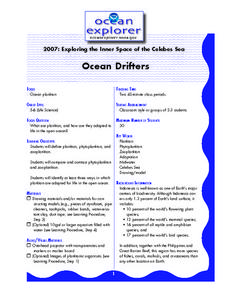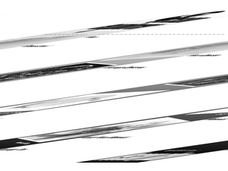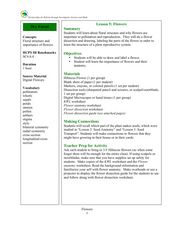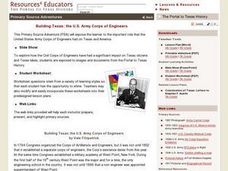Curated OER
Introduction to Earth's Dynamically Changing Climate
Students identify the most common causes of global warming. In this earth science lesson, students use an interactive website to explore changes over time in sea ice, sea level, carbon emissions, and average global temperature. They take...
Curated OER
The Water Cycle
Students describe the water cycle. Students identify the processess in the water cycle. They draw an illustration of the water cycel with arrows showing the path water takes through the cycle. Students label condesation, precipitation,...
Curated OER
The Big Blow
Students identify and explain factors that contribute to extreme storms in the Great Lakes. In this investigative lesson students study the weather systems in the Great Lakes and compare cyclones to tropical storms.
Curated OER
Ocean Life
Students research and identify ocean animals characteristics and life styles using the Internet and books. They create a PowerPoint presentation and an iMovie to present to the class.
Curated OER
Ocean Drifters
Students define terms, and identify three ways in which plankton are adapted for life in the open ocean. In this ocean drift instructional activity students design a planktonic organism.
Curated OER
Coral Reef Lesson Plan Caution: Do Not Bleach!
Learners explain five ways that coral reefs benefit humans and identify three threats to the reefs. They investigate the phenomenon of "coral bleaching" while examining ways to reduce threats to coral reefs.
Curated OER
To See or Not to See
Students identify and discuss key factors that determine how effective color camouflage is in certain habitats. For this investigative lesson students divide into groups and study light.
Curated OER
How Does Your Magma Grow?
Students identify the three types of plate boundaries and the Earth's tectonic plates system. They examine how the Galapagos Islands were formed and hydrothermal vents.
Curated OER
What's the Difference?
Learners discover how volcanic processes differ at convergent and divergent tectonic plate boundaries. They identify three geologic features that are associated with most volcanoes on Earth.
Curated OER
What's The Difference?
Learners identify geologic features that are associated with volcanoes. In this volcanic exploration lesson students compare and contrast convergent and divergent volcanoes and are able to explain why some erupt more explosively.
Curated OER
Do You Have the Key?
Students practice using a dichotomous key. For this classification lesson, students read an article about scientific exploration and identification of new species. They use a dichotomous key to identify objects and create their own key.
Curated OER
What's in that Cake?
Students discover the methods scientists use to investigate Oceanic habitats. In this oceanography lesson, students utilize the Internet to identify deep sea submersibles and how they help scientists study the Charleston Bump. Students...
Curated OER
Help, I can't reach it!
Students learn the major organ systems in the human body and research simple machines on the Internet; They design an informational brochure about a medical profession and present that career topic to the class.
Alabama Learning Exchange
Tornadoes
Students research tornadoes. For this weather lesson, students construct a KWL chart on tornadoes and view the video National Geographic-Tornadoes. Students discuss the facts they learned from the film and complete the KWL chart.
Curated OER
Dry Forest: Flowers
Students explore botany by examining diagrams. In this plant reproduction instructional activity, students define a list of plant vocabulary terms and identify plant anatomy from a diagram. Students complete several plant activity...
Curated OER
Aspects of Individual Human Blood Pressure
Learners learn about human blood pressure. In this biology lesson plan, students gain an understanding of the relationship between hypertension and it's risk factors, demonstrate how pressure builds up in clogged arteries, and measure...
Curated OER
What's in That Cake?
Students explore the depths of the Gulf of Mexico. In this deep-sea habitat lesson, students construct edible models of deep-sea habitats as they bake cakes that include representations of the habitats and the organisms that live there....
Curated OER
This Life Stinks
Learners study how organisms that live in cold seep communities get energy from methane. In this organism lesson students write a brief report and identify oxidation reduction reactions and explain if these are dependent of...
Curated OER
Inventing and Presenting Unit 1: Analyzing Nonfiction and Inventing Solutions
Students read about and identify patterns in the invention process. Students discuss and write about information learned from research. Students compile a list of problems, choose one, write a problem statement, and compile a list of at...
Curated OER
Down To Earth
Fifth graders study the physical properties of minerals in order to identify them. They examine how minerals are used before taking part in a activity in which they market toothpaste made from specific minerals.
Curated OER
Building Texas: the U.S. Army Corps of Engineers Lesson Plan
Seventh graders study the engineering projects that the US Army Corps of Engineers initiated during the development of Texas. They examine primary source documents that are in digital and print form, and identify US Army Corp of Engineer...
Curated OER
Trash...it really piles up!
Young scholars investigate a contemporary "midden" by analyzing trash collected from various sources and determining life-style choices people make. They see that reducing the amount of waste we generate is helpful to the the environment.
Curated OER
And Now for Something Completely Different...
Pupils identify organisms that are typical a part of a hydrothermal vent. They examine why hydrothermal vents are short-lived.
Curated OER
Getting to the Bottom
Students identify taxa in Arctic benthic communities. They discover organisms that live in these Arctic areas. They analyze data compiled for the Canada Basin Benthic Samples, 2002.

























